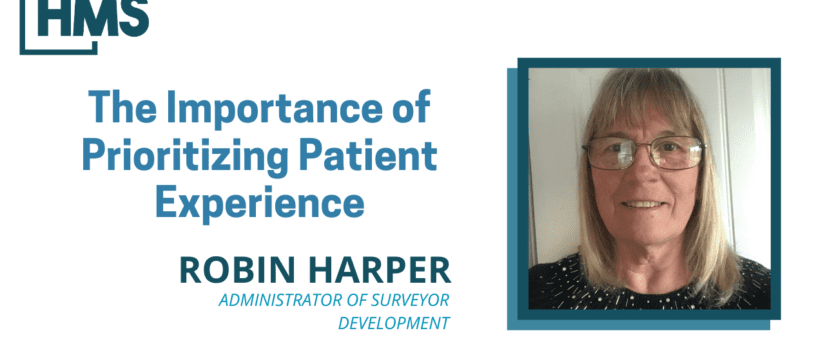
The Importance of Prioritizing Patient Experience
- April 24, 2023
- 1 Like
- 838 Views
- 0 Comments
When surveyors from Healthcare Management Solutions, LLC (HMS) visit a nursing home or other healthcare facility, one of the most important elements we assess is the residents’ experience and the delivery of patient-centered care. In this video, Robin Harper, RN, Administrator of Surveyor Development at HMS, explains why those qualities are so important, what HMS surveyors consider in particular, and how to overcome challenges in optimizing resident experience.
How do you define patient/resident experience?
When you think about patient or resident experience, you have to consider the big-picture perspective of all that it encompasses. Of course, the particulars of the experience vary depending on what type of visit we’re surveying. It might be a visit to an emergency department, perhaps a short-term stay in a rehab setting, or a complete life transition into a long-term care facility.
When I think of a positive patient experience, I think of how I am treated at my dentist’s office — who I’ve been seeing for more than 20 years. When I first walk in the door, they greet me by name. I never have to wait long. As I settle into one of their heated massage chairs, they offer to turn the TV to a program I like or turn on the radio.
They really personalize our interaction using information they’ve learned about me over the years. They know that my kids played ball, that we always like to travel to the beach, and that on our last vacation we took our oldest grandson to Disney. Everytime I visit, they ask me about those things. They don’t just keep notes about my teeth, they keep track of everything we have ever discussed. From the time I walk in to when I leave, each visit is a personalized, warm experience. That’s what delivering a positive patient experience is all about.
How is resident experience different from resident satisfaction?
Resident experience and resident satisfaction are both important in different ways. When you think about resident satisfaction, that would include things like satisfaction surveys that pose questions about how happy or unhappy you are with the medical visit or care.
When you think about resident experience, it’s really about all the extras, not just a set group of questions asking whether you were very satisfied or not satisfied. It’s gathering information about many different factors that speak to the overall experience.
Why is learning a patient/resident’s experience part of a healthcare facility survey?
Healthcare providers want to deliver the best quality of care possible. That’s why they’ve chosen a career path in healthcare. Surveys help gather information to identify areas for improvement, so they can make changes and provide a better experience for the next patient who comes in.
For example, if a long-term care facility receives feedback that the food isn’t up to par or that its activity program doesn’t offer enough options, that information provides an opportunity to improve in those areas.
Of course, surveys also present positive feedback. Either way, the facility can respond to information gathered in a survey to deliver a better patient experience.
What is patient-centered care, and why is it important?
Patient-centered care is care that revolves around a patient or resident, which is crucial because it often leads to improved individual patient outcomes. Imagine if you were a nursing home resident and the staff didn’t take time to get to know anything about you. Maybe you’ve taken showers in the morning your whole life, but they come and take you to a shower at night. Or they turn on your TV to a country-western channel but you like to watch HGTV. It matters to individual patients or residents that their care conforms to what’s important to them, their values.
How does patient-centered care affect a patient/resident’s experience and satisfaction? How does it affect health outcomes?
Whether you receive patient-centered care will impact your overall health, physically, mentally, and emotionally. If the facility’s providers or staff don’t know anything about the residents or patients they are caring for, it can have a compounding effect. Patients/residents can become depressed or experience slower recovery times for any health issues they might have, which is why providing care on a personal level is so important.
What are some of the challenges nursing home staff face in providing patient-centered care?
One of the biggest challenges is the adoption of person-centered care. It has to start with the top leadership, then trickle down to the rest of the frontline staff at the facility. That can start even at the hiring process and how staff are trained when they’re hired. The management team has to be on board and ensure person-centered care is prioritized in the facility.
In addition, staffing is posing a big challenge right now in healthcare, especially with turnover, which makes it even more crucial that person-centered care is adopted at the leadership level, and therefore becomes embedded in frontline staff’s approach.
What are some examples of poor patient-centered care?
I was once conducting a survey and found that this particular facility did a great job of assessing residents as they were admitted, identifying concerns and developing person-centered care plans that would drive the care based on the value and how that resident would want to be cared for.
However, while I was on site for the survey, a resident fractured her arm. This particular resident had a trauma-informed Activities of Daily Living care plan, which specified that she wanted showers, not baths. The plan explained that this resident had experienced a traumatic event as a child — a near-drowning incident that left her adamantly opposed to ever being submerged in water.
In conducting that investigation, I found out that the resident broke her arm because the staff were attempting to give her a bath. They used a mechanical lift that submerged her into the water and, of course, she reacted, throwing her arms and kicking her legs, which resulted in a fractured arm.
Clearly, this was not person-centered care. Even though the facility had developed a great care plan, the staff were not aware of what it entailed and as a result, they caused trauma for that resident.
How can nursing homes improve their ability to provide patient-centered care?
As mentioned earlier, the facility’s leadership must buy into the concept of person-centered care, and it has to be part of the culture and everyday operations.
It’s also important to involve family. From the admission process forward — and sometimes even earlier — gathering information from family members about the resident’s life and their care preferences is key. Of course, staff need to be involved as well to ensure that the information gathered is disseminated and implemented appropriately.
What is HMS’ role in determining patient and resident experience and satisfaction?
I think the biggest thing we do here at HMS — and this work really takes a village of people — is training. It’s part of our survey process, so we all are very much aware, when we interview residents during a survey, to ask very specific questions about person-centered care.
It all comes down to ensuring that all surveyors receive adequate training, education, and evaluation. We get that with new hires, but it also trickles out into the field, because we have such a great group of surveyors. We all educate each other. If a question arises in the field, one surveyor is willing to help another, which is a great asset.
Do you have a personal connection to the patient experience issue?
I’ve been a registered nurse for 30-plus years and I’ve spent my entire career in long-term care. It’s a passion that’s grown over time from working in that field as a nurse, then moving on to being a surveyor, and then on to training surveyors.
If I can walk out of a survey and feel like I’ve made a difference for just one resident, it’s heartwarming and makes you feel so good inside. Just being on that personal level, one change, one little trickle of highlight in a resident’s day just makes all the difference to any healthcare provider.

